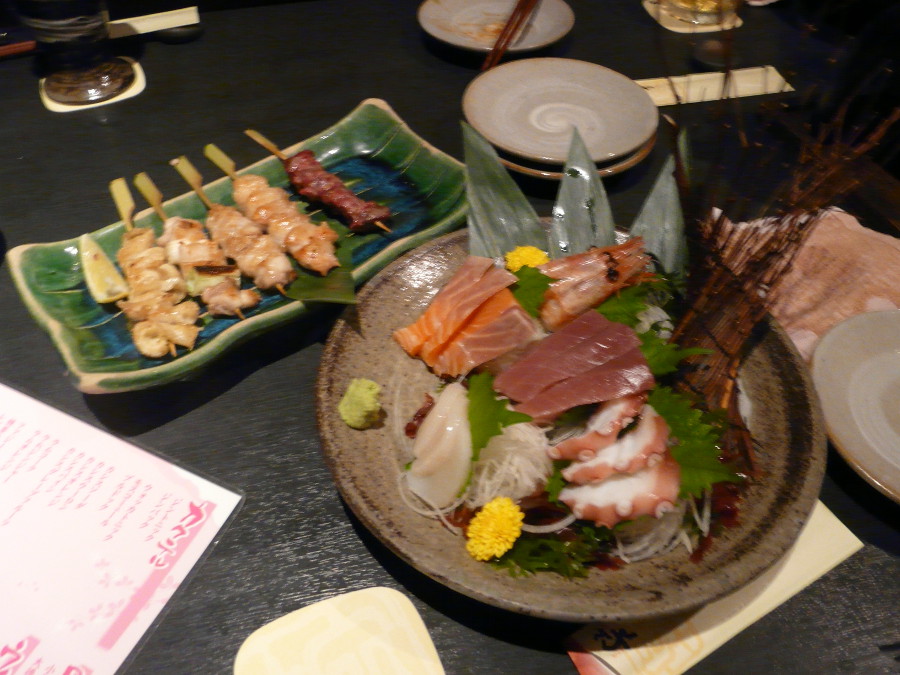Why with gaijins instead of the Japanese? The answer is quite prosaic: because in Japan gaijins are the ones who arouse interest, they are different. Inadvertently or deliberately stand out from the crowd. Sometimes they know nothing about the culture of Japan and behave outrageously, sometimes they lurk in the corner while taking pictures, so as not to destroy the harmony of the moment. Try as hard as they may, they still won’t be able to hide their otherness. Who is gaijin?
Gaijin – someone “not from here”
Gaijin supposedly derives from the Japanese word gaikokujin meaning “a person from another country” (gai – from the outside; koku – the country; jin – the person). In time, the word has transformed both in terms of pronunciation and writing (missing koku), but also in meaning, as it expanded from the difference in ethnicity and/or origin to just being different.
Robot Restaurant – apparently the craziest restaurant in Japan
In addition, the word is now considered offensive and inappropriate. Instead, some Japanese use the original form gaikokujin or more honorific gaikoku no kata which is a “lady/gentleman from abroad”. Several times I heard the Japanese use the word gaijin in relation to other people, but never felt it was negative. I remember two particular moments the most: the first one occurred in Hakone, the second during the sumo tournament. The first moment is one of the most endearing moments of my stay in Japan. That time we sailed on the ship by the lake. A small child, staring at us with fascination and shock, shouted enthusiastically while showing us with his finger: “Mom, gaijin!”. The child had been gently rebuked for his actions, as it is not proper to use the word, much less finger pointing at someone. But how could have this boy known about all this? The more that he was carried away by his emotions 🙂 Maybe we were the first foreigners he had seen in his life? Did I feel offended in any way in such a situation? Of course not! The more that the situation amused also other passengers on board, that is the Japanese themselves 😉
Be a positive Gaijin! 🙂
Should you feel proud of being a gaijin?
Personally, I find this word very neutral. However, being a gaijin in Japan has many advantages. The Japanese really care about the reputation of their country, so when they see a gaijin in need and are able to help, they certainly will. They will show the way, advise in the restaurant, tactfully stop you when you’re doing something wrong (in this case you should apologize, and thank for helping you in your improvement). However, you will not experience the beautiful, small gestures of kindness and concern from the Japanese people, if you behave rudely.
If in your head you very carefully nurture a belief that being a gaijin is cool, and for this reason you should have special privileges, you may get surprised upon your arrival. The Japanese will not help screaming gaijins, especially when they are drunk. Expect also that if behaving inappropriately or worse, you will be asked to leave the restaurant. Everyone will be nice to you, of course, but no one will approach you. Japanese men and women will be fascinated by your otherness and may feel tempted to flirt with you, but will disappear from the horizon as soon as they discover that you are a boor. There are far more examples than those mentioned. Although general ignorance of Japanese culture by gaijin is here treated with a wink, a lack of general manners will not help you in making friends. Remember that certain cultural rules of behavior are common to all countries of the world. If you do not want to spend those few hours to read from cover to cover at least one good book about Japanese culture, at least keep the basics of good manners. Before you enter the role of a released-from-the-cage wild animal, ask yourself whether you’d feel comfortable if someone behaved like you do now, but in front of you in your country? This question usually dissipates most of the doubts.
If you do not have time to read, and you want to know something about the culture of Japan – watch this girl’s videos. Although I do not agree with all of the content from the videos, I think that she is doing a really good job – I recommend watching 🙂
You won’t be able to defeat the Japanese in a karaoke duel!
Karaoke is a very popular way to spend the evening with friends. Japanese karaoke bars work, however, a little different than karaoke bars that I’ve seen in Poland. Sometimes, entire buildings are intended solely for the karaoke bars. Moreover, most of the big Japanese electronics companies, manufacture equipment for karaoke. In addition, these bars are the only places in Japan where you can make noise with no consequences. For this reason, our Finnish friends living in the Land of the Rising Sun practiced there with their rock band 🙂 They could do it freely, because in a Japanese karaoke bar you can rent a private room. Sometimes in the package with the room one can get a set of free snacks, it is possible to order food and beverages/drinks, sometimes you can purchase the “all you can eat/drink” menu – there are no rules in this matter.
A few words about karaoke
Do not get fooled by appearances. The Japanese are masters at their songs, and I do not mean only the songs in Japanese. Even if the Japanese choose a song sung in English, then they sing it flawlessly and in beautiful English pronunciation. Do not delude yourself that you have a chance – if you get a head start, you are still likely to lose 😉 Aside from losing, karaoke really brings together people. If you take up the challenge but lose, you will gain respect and earn points of sympathy so this is not a loss at all 🙂
Themed Restaurants
These are mainly cosplay restaurants where the waiters and waitresses are dressed up as characters from manga/anime or characters matching the styling of the place. And so you can meet zombies, police officers, prison guards, students, nurses, etc..
From what I know, the most popular among tourists are cosplay restaurants called Maid/Butler Cafes. These are places originally created for fans of manga and anime, that is otaku, but because of their uniqueness they attract crowds of foreigners. Cafes are dedicated to men (Maid Cafe) or women (Butler Cafe). In such places, the waiters or waitresses (always the opposite sex) support guests in unusual costumes modeled on maids/butlers. Apparently, they respond to any request “Yes, Master/Mistress”, hence the high interest, particularly among men. Ladies can also enjoy the water’s manners to the full. In some cafes one can play a game with the waiter/waitress, get a massage (fully clothed, for an additional fee) or get spoon-fed. At present, some cafes also introduce minor hygienic or cosmetic services. Making photographs of people and design by yourself is forbidden, but for an extra charge it is possible to get such photos – the staff fill make them for you. Touching waiters/waitresses is strictly prohibited, as well as asking about contact details or personal life. Additionally, the waiters and waitresses are chosen for the job by their appearance – only attractive people are invited for interviews. The rivals are not wasting their time either 🙂
Unfortunately, we (me and my husband) did not have the opportunity to visit any of those restaurants. Apparently it is worth it, impressions are unforgettable, so the next time we visit Japan, we will certainly go into such a place. Here is our subjective list of the most wacky theme restaurants in Japan, to which we would like to pay a visit (the order is not accidental):
- Cannibalistic Sushi
- Alcatraz E.R. or The Lockup (prisons)
- Vampire Cafe
- Biohazard Cafe and Grill Bar or Capcom (Resident Evil style)
- Shinjuku 8bit Cafe
- Butlers Cafe – maid cafe for the ladies and/or Maidreamin’s Digitized Cafe and Dining Bar (Mario themed maid cafe)
- Alice in Wonderland
- Luid’s Bar: Dragon Quest
- Kamen Rider The Diner
- Robot Restaurant
If you like to hunt for your lunch/dinner, you will love the Zauo restaurant. It is not a cosplay restaurant though, but I think it is worth mentioning 🙂
“All you can drink” in an izakaya restaurant
Izakayas are often traditional-looking bars that offer mainly alcohol and snacks. In respect of tradition, guests often need to leave shoes before entering the restaurant in special small lockers. From the snacks enjoyed the most yakitori chicken, which was also the most surprising for me, as the grilled pieces of chicken were those, which people in Europe usually do not eat, like pieces of cartilage or skin. All of the small chicken bites were studded with wooden sticks, which looked like small shashliks. However, there were delicious! Among other snacks one can find sashimi, grilled vegetables, fried tofu, soya beans (boiled are awesome), pieces of chicken meat.

Sample snacks at an izakaya restaurant
But back to the main point of the program, the alcohol, it is a bit complicated. Although the option is called “all you can drink”, you really can not drink everything you can. Even though the name suggests something completely different, this option consists of a fixed amount of alcohol. Quite large, it is true, but this is not an unlimited option. A typical Japanese man after drinking in this option would become very drunk, but not a Pole, Finn or Russian. Cautious restaurant owners have predicted that guests may be finishing liquor too fast, so each new carafe of sake that we got was getting smaller. Fortunately, my beloved umeshu rokku was brought to me in glasses of the same size 😉
But how do we know that you can not drink yourself into a stupor? Well, our friends Finns went once on some hard partying, during which they ordered the “all you can drink” option. As the Finns usually do, they drank a lot. During one of his visits to their room, the waiter explained to them that they will not get any more alcohol because… it would not be profitable for the restaurant anymore 😉
Meeting in an Okinawan restaurant
One of our meetings with our Finnish and Japanese colleagues and a fellow Pole, took place in a well-hidden restaurant with Okinawan cuisine. Since we could not get there, one of the Japanese sent us the coordinates with a link to a map. Unfortunately, we were unable to open it using our unadjusted European mobile phone. Fortunately, we came upon one of our friends, and thus found ourselves where we should have gone.
At parties each person can make an order, but the order does not go to the person directly but on the table to share with others. Everyone can eat from the meal at will, so it may happen that you will not be able to try your order. Exceptions are ordered drinks, which are not served in carafes. If you ordered some alcohol in a carafe, do not pour the alcohol yourself – you should pour the alcohol to the glasses of those on your right and left, and they to yours. Traditionally, the woman should ensure that no one has an empty glass, but what to do when there is no woman nearby? 😉
Typical gaijin for a hard party and flirting goes to Roppongi – Tokyo district with the largest number of partying places
Although the main meats consumed in Okinawa are pork and goat, this restaurant in its offer also had horse meat (in Okinawa they do not eat horses, to be precise). We took the soup made of the horse’s gut (we were brought a pot with a gas burner in the set) and raw meat slices. It was my first try of horse meat, but I admit that it was delicious.
In addition to horse, in some Japanese restaurants you can taste turtle, whale, or dolphin. The last two are only “thanks” to “research programs”, which are conducted on populations of these animals.
As it usually happens, after a certain amount of alcohol people start to tell and ask things. I read that the Japanese derive much joy from playing guessing games. They guess different things, like: age, zodiac sign, and blood type. It is wise to read beforehand about your blood type and personality traits attributed to it, as in Japan blood type is a determinant of human personality. Do not ask questions about private life if you are not close to the Japanese whom you would like to ask. It’s rude, and even if you get an answer it may badly affect your relationship. Do not ask for help, which is not needed, even when joking – the Japanese are unable to and do not like to refuse, they feel obliged to help, and because this such a situation can be stressful for them.
When it comes to paying for the bill, often the older pay more than the younger people, because they earn more. It may also happen so, that for some reason you had not eaten hardly anything – it is possible that one of the other party guests may suggest that he/she would pay a little more, because they ate more. If, however, age and social status of participants is similar, the bill is split evenly, no matter how many each participant ate. Do not give tips as they are included in the service price. You do not always pay the waiter – at some restaurants you should pay the cashier at the exit.
About the events, places to party and event stories from Japan I could talk a little more. Nonetheless, I will not tell you everything, unfortunately, because I know that I have a few younger readers. I hope you will forgive me 😉 In a week I will invite you to read about… some old wives’ gossip! 😉
Interesting links:


